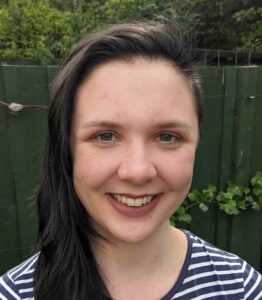The latest student to complete a research project partly funded by the Neurosciences Foundation says it couldn’t have been done without the foundation’s support. And she says it points the way to potentially new treatments for the most common and most lethal adult brain cancer, glioblastoma.
 Ellen Poot, a PhD student at the University of Edinburgh’s School of Chemistry, was looking into the possibility of delivering anti-cancer drugs to brain tumours by means of microparticles designed to activate immune cells within the cancer itself.
Ellen Poot, a PhD student at the University of Edinburgh’s School of Chemistry, was looking into the possibility of delivering anti-cancer drugs to brain tumours by means of microparticles designed to activate immune cells within the cancer itself.
The project required Ellen to develop new interdisciplinary skills, including making the microparticles and acquiring the expertise to inject them into the brains of zebrafish. Ellen used three drugs, one of which is in common use. But the other two have rarely or never been used in this way.
A crucial and novel aspect of the work was the use of microparticles instead of even smaller nanoparticles. The intention was to make sure that the drugs were only taken in by the appropriate cells and were too big for others to absorb.
Ellen’s results have been positive. There were signs that the two drugs were stimulating immune cells to reduce the size of tumours. However, Ellen says much more work is needed to confirm what she describes as a promising trend.
Ellen is clear about the value of the grant from the Neurosciences Foundation.
In our initial work, the fact that we were able to test either of these two drugs was entirely to do with the funding that we received from the Neurosciences Foundation. The original funding for the project would not have stretched far enough to be able to test these drugs, despite the fact that they’re already available on the market. They’re very expensive often. And for us to have been able to test these has been really incredibly useful for this project and they do show some promise, which is very exciting.
That is backed up by her supervisor, Alison Hulme, who’s a professor of organic chemistry at the University of Edinburgh.
It was very, very valuable in terms of making the research much wider in what we could actually look at.
Ellen now hopes to take her research on to the next phase. That might include working out an effective delivery method, which could be a nasal spray. This technique would surmount the blood-brain barrier, which has made it so difficult to develop effective treatments for glioblastoma and other brain cancers.
Professor Hulme points out that glioblastoma is the most deadly kind of brain cancer. She says only five to ten percent of patients are still alive after five years and the average survival time is less than one year.
The hurdles which have to be negotiated to get more research funding are formidable but Professor Hulme says the devastating impact of glioblastoma means this is vital work which should be pushed forward.
The take-home message is that glioblastoma is crying out for new treatments. For most other forms of cancer, there are lots of different treatments and glioblastoma multiform is just in this hole, where there is basically only one drug that is used for treatment.
Both Professor Hulme and Ellen Poot are hopeful that there will be opportunities to work towards the goal of making glioblastoma more treatable and more survivable, but that will not happen without the necessary funding.
The Neurosciences Foundation is delighted to have been able to help Ellen to complete this stage of her research. We hope that she will have the chance to do more work in this important area of neuroscience and we look forward to following her progress in the future.

